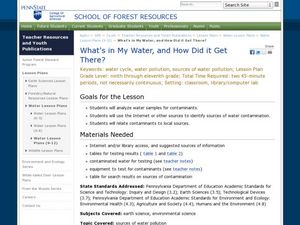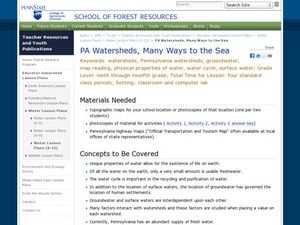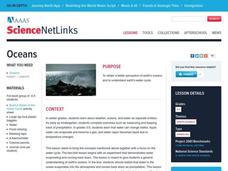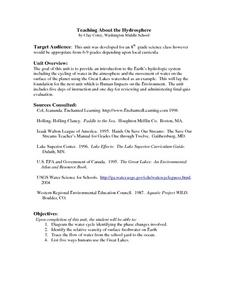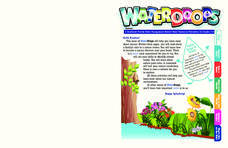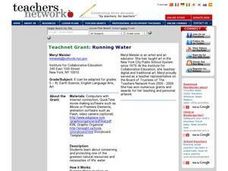Curated OER
What's in My Water, and How Did it Get There?
Students analyze water samples to see the contaminants and then use the Internet to find the sources of the contamination. In this investigative water lesson students analyze water and work together to solve the mystery of...
Curated OER
Water: Naturally Cleaned
Learners use stream trays covered in different types of rocks or soil to investigate infiltrates and runoff. In this water pollution instructional activity, students work in groups with stream trays that have different substrates. They...
Columbus City Schools
ABC: Acid Base Chemistry
Bubble, bubble, boil and trouble! What causes common substances like baking soda and vinegar to react the way they do? Welcome your junior chemists to the wonders of acid-base chemistry using a comprehensive and fun...
Curated OER
Water Cycle: Weather Lesson 1
First graders go on a water walk, collect weather data, and measure rainfall for a month. They examine the water cycle in this series of lessons.
Curated OER
Physical Changes and States of Matter- Two
Third graders explore the concept of evaporation as they observe how the water level changes in a cup that is left out. Working in groups they observe physical changes in a group of everyday items. They record the changes in shape, size,...
Consortium for Ocean Science Exploration and Engagement (COSEE)
Life Cycle of Blue King Crabs
The blue king crab and the red king crab live in the same range but never in the same region. The third lesson in the series of five focuses on the blue king crab and the impact the changes in water temperature is having on its...
Curated OER
Acid Rain
Create a simulation of acid rain in your classroom with lemon juice and bean plants to help kids study the effects of pollution on plants. In addition, learners will listen to a story and write responses based on guiding questions.
American Chemical Society
Evaporation
This is one in several lessons that explore the relationship between temperature and phase changes of water. After some discussion, elementary physical scientists place wet paper toweling on a hot and a room-temperature water bag...
Curated OER
The Water Cycle
Third graders investigate water formations by conducting an experiment. In this water properties instructional activity, 3rd graders utilize pie tins, sponges and salt shakers to create an evaporation and saturation experiment. Students...
Curated OER
PA Watersheds, Many Ways to the Sea
Students examine the water cycle and the factors that interact with watersheds. In this watersheds lesson students describe the purification process, trace the flow of infiltrate water through aquifers, and research the Internet to...
Curated OER
The Rain Cycle
Third graders draw the rain cycle. In this rain cycle lesson the students listen to the story The Legend of the Bluebonnet by Tommie DePola. As they listen to the story they sketch what is happening. The students write a sentence for...
Curated OER
Oceans
Students use their prior knowledge to being their examination of the water cycle. In groups, they complete an experiment in which they can see water evaporating and coming back to the ground. They discover the ocean's water evaporates...
Curated OER
Water World
Students explore the various steps of the water cycle. They identify the three steps in the water cycle and how they are related. Students describe three ways to conserve water. Students explore the origin of the water source that...
Curated OER
Teaching About the Hydrosphere
Eighth graders are introduced to the Earth's hydrologic system including the cycling of water in the atmosphere and the movement of water on the surface of the planet using the Great Lakes watershed as an example.
Curated OER
PLANT LIFE CYCLES
Student learns about the life cycle of plants by watching a time-lapse video. This activity provides young scholars with further evidence that all living things grow and change as they progress through their life cycle. Student conducts...
Curated OER
Waterdrops
In this environment worksheet, students read an article about water drops and the nature center. They pretend that they are going to a nature center and write what they would hope see there. Students also identify living things and...
Curated OER
Science Videos
Students plan, practice, and act in a 2-3 minute videotaped production about a specific topic. Students from a local high school give presentations pertaining to seasons, earth rotation, and moon phases. Students analyze the...
PBS
Blow the Roof Off!
Blow the minds of young scientists with this collection of inquiry-based investigations. Based on a series of eight videos, these "hands-on, minds-on" science lessons engage young learners in exploring a wide range of topics...
PBS
Reading Adventure Pack: Oceans
Flotsam by David Wiesner and The Magic School Bus on the Ocean Floor by Joanna Cole, illustrated by Bruce Degen, begin a reading adventure pack focusing on oceans. With story listening and thoughtful discussion, scholars complete several...
Curated OER
Moist Air & Clouds
Fifth graders study the weather and water cycle of clouds. In this water cycle lesson, 5th graders read background information about evaporation, condensation, and the states of water.
Curated OER
Send in the Clouds
Learners culminate a study of the water cycle by following step-by-step directions to make a three dimensional cloud. On the model, they draw a diagram of the water cycle and label it, and add a written report they completed in a...
Curated OER
Cloud Formation
Fifth graders discuss the weather and cloud formation. They rotate, in groups, through various activity stations set up in the room. Stations include activities such as researching types of clouds, drawing pictures of the water cycle,...
Curated OER
Running Water
Sixth graders create products that feature the importance of water conservation. In this environmental stewardship lesson, 6th graders explore the water cycle and conduct on water usage. Students also research water pollution and...
Curated OER
The Case of the Missing Water
Students examine the major concepts related to the water cycle in this instructional activity. They recognize and define evaporation, condensation, precipitation and the natural cycles that occur as weather. They also participate in an...
